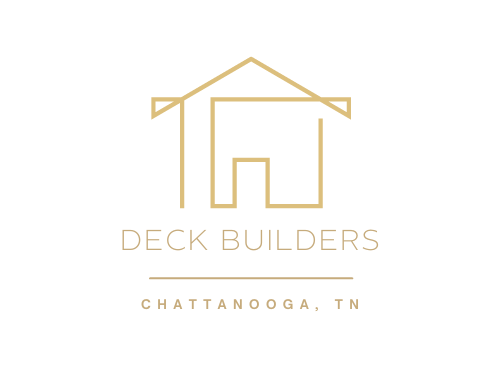Decking Guide
Deck Builders of Chattanooga
A Guide to Your New Home Deck
This guide to choosing new decking is our essential resource for enhancing your home's outdoor living space. For homeowners considering the addition of a deck, the choices may seem overwhelming, with a variety of decisions to make regarding materials, design, and maintenance.
The right deck can significantly elevate your property's aesthetics and functionality, providing a cozy haven for relaxation, entertainment, and family gatherings. In this comprehensive guide, we'll explore the crucial aspects of decking, including selecting the best decking material, understanding the characteristics of the longest-lasting deck materials, and delving into the pros and cons of options like composite decking, PVC decking, and classic wood decking. Our goal is for you to be well-equipped to make informed choices, ensuring that your new deck not only meets your needs but also becomes a beloved and enduring addition to your home.
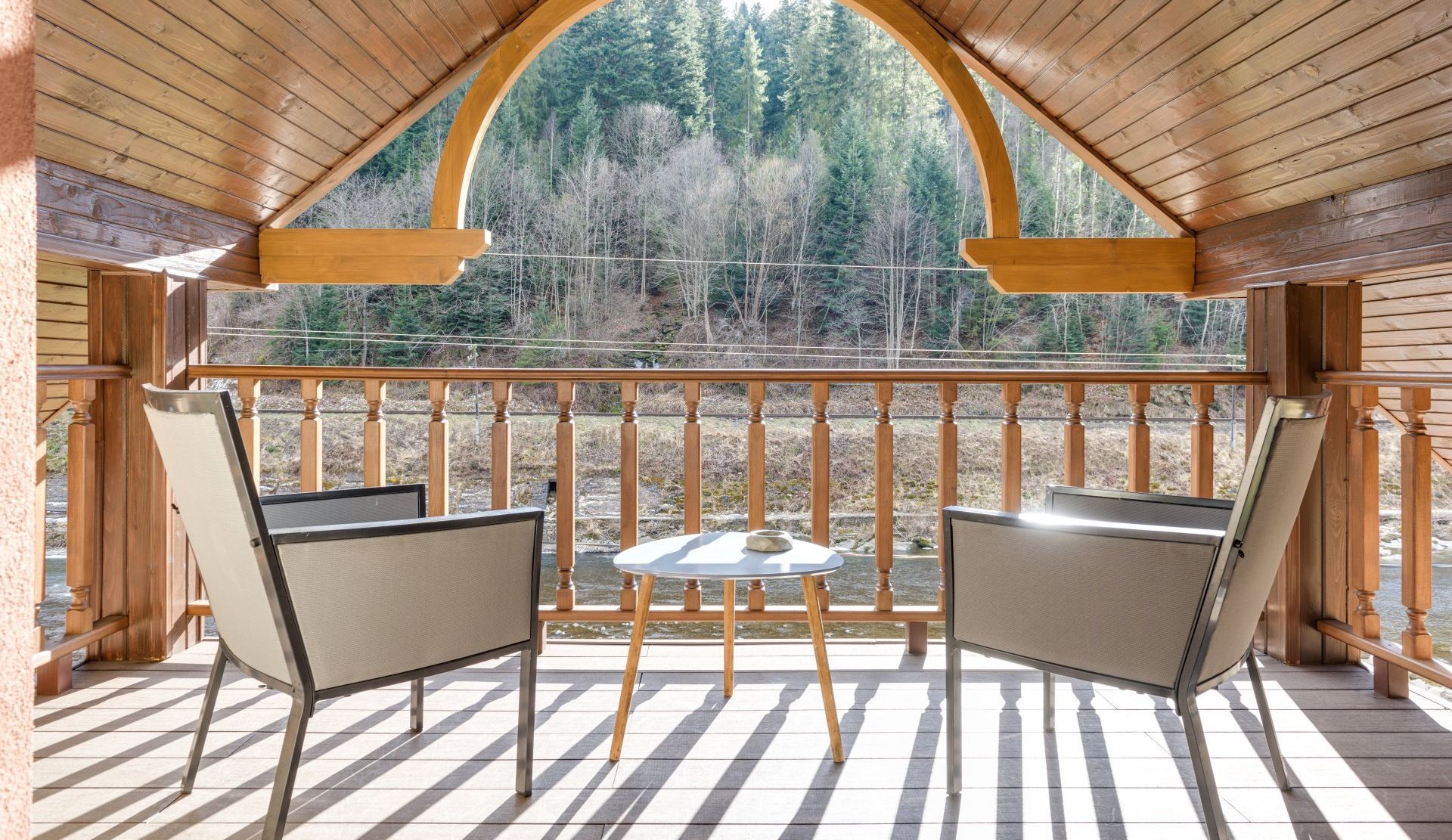
What Is the Best and Longest Lasting Deck Material?
Creating the perfect deck for your home is an exciting task, but it's essential to choose the right decking material to ensure your investment stands the test of time. A well-constructed deck is not only a fantastic addition to your home but also a valuable outdoor space for relaxation and entertainment. In this guide, we'll explore several high performance and popular decking materials: composite decking, PVC decking, pressure-treated wood decking, cedar wood decking, and aluminum decking.
Composite Decking
Composite decking has risen to prominence due to its combination of durability, aesthetics, and low maintenance. It's an excellent option for homeowners who seek a long-lasting, low-maintenance deck.
Pros:
- Durability: Composite decks are highly resistant to rot, insects, and decay, ensuring a long lifespan.
- Low Maintenance: Unlike wood, composite decking doesn't need frequent staining, sealing, or painting.
- Aesthetics: There's a wide range of colors and textures available, often mimicking the look of natural wood.
- Eco-Friendly: Some composite materials incorporate recycled content, promoting sustainability.
Cons:
- Initial Cost: Composite decking can have a higher upfront cost than some other materials.
- Heat Retention: In very hot climates, composite decks can become warm to the touch.
PVC Decking
PVC (polyvinyl chloride) decking is a synthetic material known for its exceptional longevity and minimal maintenance requirements. It's an excellent choice for homeowners seeking a virtually maintenance-free deck.
Pros:
- Extreme Durability: PVC decking is highly resistant to stains, mold, and moisture, ensuring a long-lasting deck.
- Low Maintenance: No need for staining, sealing, or sanding.
- Color Choices: PVC decking comes in various colors and textures, allowing you to match your home's aesthetic.
Cons:
- Cost: PVC decking can be more expensive than other materials.
- Temperature Sensitivity: In hot climates, PVC decking can become hot to the touch.
Pressure-Treated Wood Decking
Pressure-treated wood is a classic choice for homeowners seeking a natural wood appearance with added durability. It is one of the most widely used and cost-effective options.
Pros:
- Affordability: Pressure-treated wood is often the most budget-friendly option.
- Durability: Treated lumber resists rot, insects, and decay, extending its lifespan.
- Versatility: It can be stained or painted to match your desired look.
Cons:
- Maintenance: Regular maintenance is necessary, including staining and sealing, to preserve its appearance and longevity.
Cedar Wood Decking
Cedar wood is renowned for its natural beauty and exceptional resistance to decay and insects. It's an excellent choice for those who appreciate the classic look of natural wood.
Pros:
- Natural Beauty: Cedar offers an elegant, timeless appearance.
- Resistance to Decay: This wood is naturally resistant to rot and insects.
- Sustainability: Cedar is often harvested from sustainable sources.
Cons:
- Maintenance: Cedar wood requires regular sealing and staining to preserve its appearance.
Aluminum Decking
Aluminum decking is a relatively new but intriguing option known for its durability, low maintenance, and sleek modern look. It's a fantastic choice for homeowners who prefer a contemporary design.
Pros:
- Durability: Aluminum is highly resistant to rust, rot, and insects, offering a long lifespan.
- Low Maintenance: Minimal upkeep is required, making it a low-maintenance option.
- Lightweight: It's lighter than most other decking materials, simplifying installation.
Cons:
- Heat Conductivity: In direct sunlight, aluminum can become quite hot to the touch.
The best and longest-lasting deck material for your home depends on your specific preferences, budget, and maintenance tolerance. Composite and PVC decking are great choices if you prioritize low maintenance and durability. Pressure-treated wood and cedar wood are suitable for those who appreciate the classic, natural wood look and are willing to invest in upkeep. Aluminum decking is a modern, low-maintenance option that suits contemporary design preferences.
By planning your deck project with Deck Builders of Chattanooga, we can guide you in selecting the ideal material to meet your needs. Together, we'll ensure your deck not only complements your home but also provides a durable and long-lasting outdoor space for years to come.
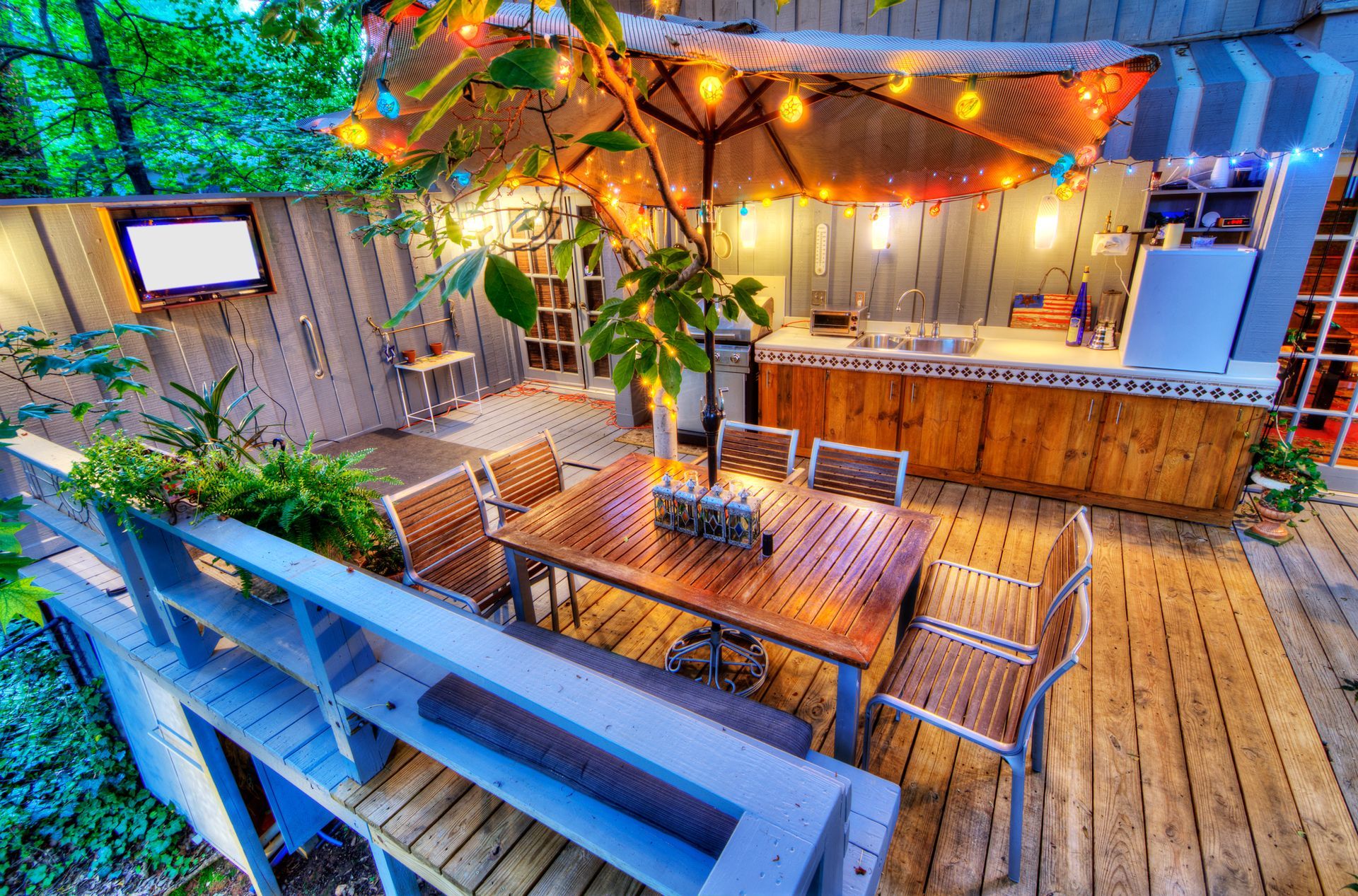
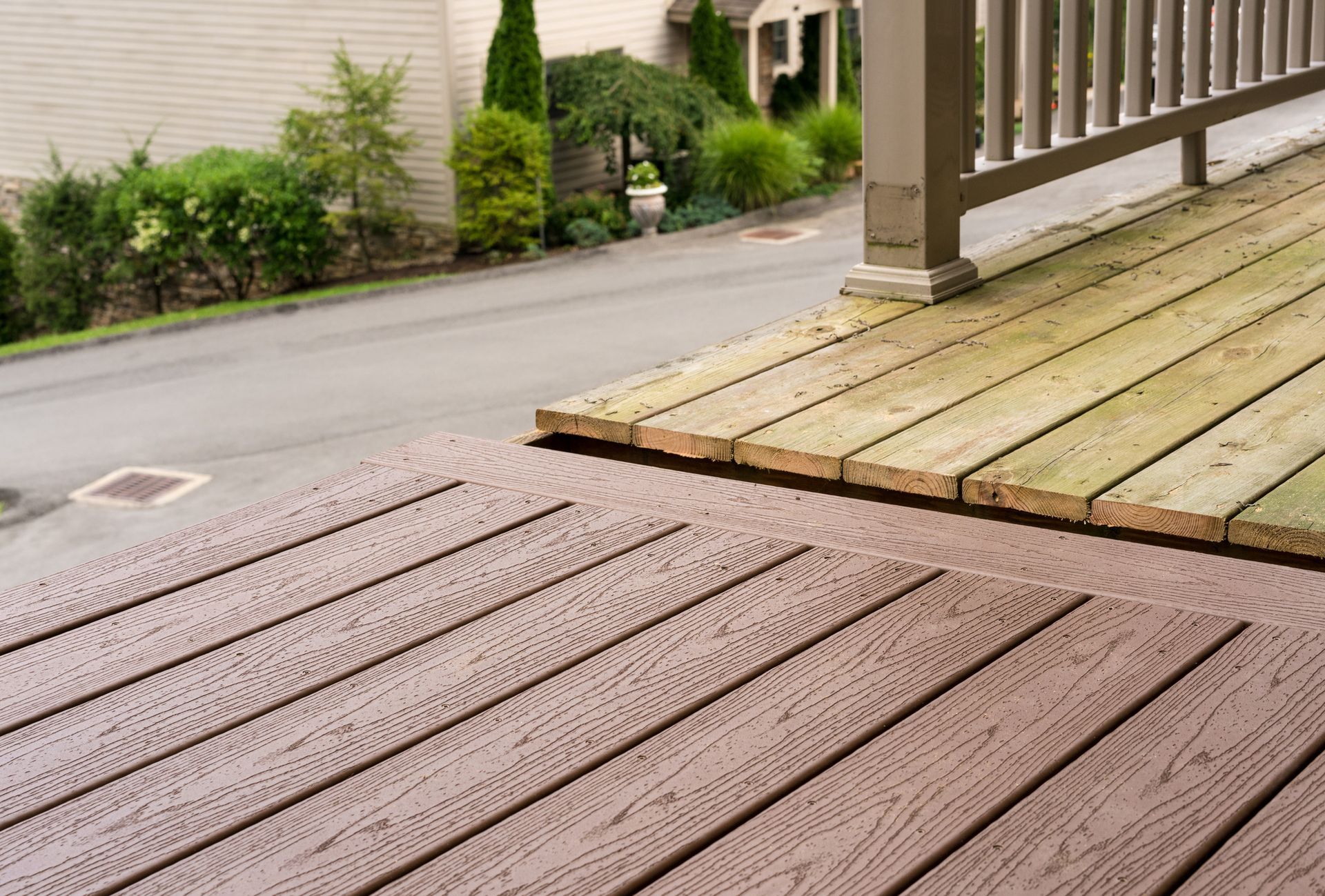
Things to Know Before Choosing a Deck Material
Before selecting a decking material, there are several crucial factors to consider. First, your local climate and the specific environmental conditions your deck will face has the biggest impact on material selection. Different materials respond differently to heat, cold, humidity, or dryness, so understanding your climate is key. In a humid subtropical climate like Chattanooga with snowy winters, high resistance to heat and cold is key. Budget considerations are also essential, encompassing both material and installation costs. It's vital to assess your long-term maintenance commitment since various materials have varying maintenance needs. Additionally, aesthetics are just as important. Think about colors, textures, and finishes to ensure your deck complements your surroundings. Environmental concerns may also play a role; consider the sustainability of the material, its source, and its recyclability.
Don't forget to check local building codes and regulations to ensure your material choice complies with safety standards. Slip resistance is important for safety, especially if your deck will be exposed to rain or near a pool. Consider the weight of the material and its compatibility with your deck's support structure. And last but not least, factor in installation expertise – some materials are more DIY-friendly, while others may require professional installation. Research the manufacturer's reputation, product warranties, and ensure you have or are willing to acquire the tools and products necessary for maintenance. When you choose Deck Builders of Chattanooga, we check all codes, regulations, and factor in all safety considerations for you, so you can have your new deck designed and installed stress-free.
Deck Material Comparison
| Composite | PVC | Pressure-Treated Wood |
|---|---|---|
| Low Maintenance | Low Maintenance | Requires Regular Maintenance |
| Rot, Warp, Stain Resistant | Rot, Warp, Stain, Moisture Resistant | Rot Resistant with Coating/Sealing |
| Variety of Finishes | Variety of Finishes | Natural Finish |
| $25-50 per sq ft (labor included) | $25-50 per sq ft (labor included) | $20-40 per sq ft (labor included) |
What to Consider When Designing My Deck?
The most important aspects of deck design encompass several key factors that ensure your deck not only looks great but also functions well and serves your needs effectively. First and foremost is the functionality of the deck. Determine how you plan to use the space, whether it's for outdoor dining, relaxation, entertaining, or a combination of these. The function will guide the layout and features of the deck.
Location and orientation play a vital role. Consider the sun's path, prevailing winds, and the relationship to your home. Your deck should be oriented to take advantage of sunlight and prevailing breezes while offering comfortable outdoor conditions.
Safety is paramount. Ensure your design includes safety features such as sturdy railings, proper stairways, and slip-resistant surfaces, especially if your deck is exposed to the elements.
Size and layout are equally significant. Define the dimensions and layout of the deck to accommodate your intended activities. Finding the right balance between spaciousness and fitting within the available space is key.
Materials and aesthetics are crucial for the overall look of your deck. Choose materials that match your home's architecture and your personal style. Consider colors, textures, and finishes that harmonize with the surroundings and contribute to the deck's visual appeal.
Privacy can greatly enhance your deck's usability. Think about elements like screens, trellises, or landscaping to create a more secluded and intimate deck space.
Planning for the future is also essential. If you anticipate expansions or changes in the future, design your deck to accommodate these potential modifications.
Consulting with a professional designer or architect can be highly beneficial, especially if your deck design involves complex elements or you're uncertain about certain aspects. At Deck Builders of Chattanooga, our professional contractors have the expertise that can help you achieve a deck that's not only aesthetically pleasing but also functional, safe, and suited to your needs.
How Should I Maintain and Clean My Deck?
Your deck is not just an outdoor extension of your home; it's a space for relaxation, entertainment, and making memories with friends and family. To ensure your deck stands the test of time and continues to be a beautiful and safe haven, regular maintenance and cleaning are essential. In this guide, we'll explore five key tips on deck maintenance and cleaning to help homeowners keep their decks in top-notch condition.
1. Regular Inspections
The first step in deck maintenance is to perform regular inspections. Check for signs of wear and tear, including loose or damaged boards, rusted fasteners, or rot. Pay close attention to the structural integrity of the deck, as safety should always be a top priority. Address any issues promptly, as they can worsen if left unattended. Tighten or replace loose fasteners and fix or replace damaged boards as needed.
2. Thorough Cleaning
Cleaning your deck is a crucial part of maintenance. Over time, dirt, mold, mildew, and stains can accumulate on the surface, affecting its appearance and potentially creating safety hazards. The cleaning method will depend on the deck material:
- Wood Decking: Use a deck cleaner specifically formulated for wood. Scrub the surface with a stiff brush or use a power washer at a low setting to remove dirt and grime. Be gentle to avoid damaging the wood.
- Composite Decking: A mild soap and water solution, along with a soft-bristle brush or mop, is usually sufficient for cleaning composite decks. Avoid using abrasive cleaners or pressure washers, as they can damage the surface.
- PVC or Vinyl Decking: A simple soap and water solution is typically enough to clean PVC or vinyl decking. Avoid abrasive cleaners and stiff brushes to prevent scratches.
3. Stain and Seal
For wood decks, staining and sealing are essential steps to protect the material from the elements. A quality wood stain not only enhances the appearance of the wood but also provides a barrier against UV rays, moisture, and insects. Follow the manufacturer's instructions for proper application and reapplication timelines. Sealing the deck after staining further fortifies its defense against the elements.
4. Protect the Finish
To prevent damage to your deck, use protective measures. Consider placing mats or rugs in high-traffic areas to reduce wear and tear. Install pot feet or saucers under potted plants to promote air circulation and prevent staining. Never place hot items directly on the deck surface, as this can cause discoloration and damage.
5. Seasonal Maintenance
Adjust your maintenance routine based on the seasons. In colder climates, clearing snow and ice promptly to prevent moisture damage is crucial. Remove debris regularly to prevent mold and mildew growth. Be especially vigilant about checking for loose fasteners and splintered boards in spring to ensure your deck is safe and ready for the upcoming warm months.
A Guide to Deck Pricing
The costs of different types of deck materials can vary significantly, depending on factors like the material itself, deck size, and labor costs for installation. Here's a rough comparison of the costs for our five most popular deck materials, including labor costs:
Composite Decking:
- Material & Labor Cost (per square foot): $25 - $50
PVC Decking:
- Material & Labor Cost (per square foot): $25 - $50
Pressure-Treated Wood Decking:
- Material & Labor Cost (per square foot): $20 - $40
Cedar Wood Decking:
- Material & Labor Cost (per square foot): $25 - $45
Aluminum Decking:
- Material & Labor Cost (per square foot): $30 - $60
It's important to note that these cost estimates are approximate and can vary based on factors such as material cost and complexity of the deck design. To get an accurate estimate for your deck project, give Deck Builders of Chattanooga a call today at 423-551-9856.
Contact Us - We Are Local!
Home Page Bottom Form
Thank you for contacting us. We will get back to you as soon as possible. For speedier and more urgent service, feel free to give us a call at 828-818-8482.
Please try again later
Location
Call
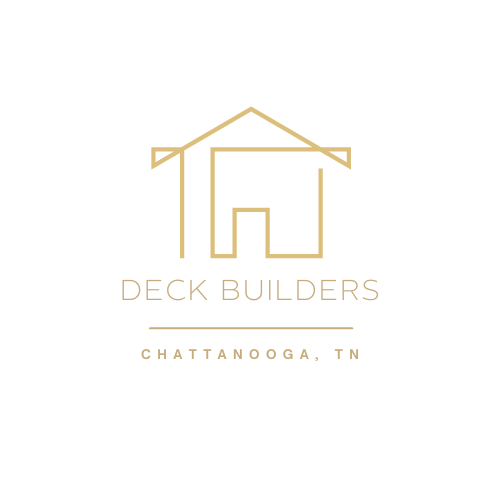
Chattanooga's #1 Deck Builders
Pages
Working hours
- Mon - Sat
- -
- Sunday
- -
All Rights Reserved | Deck Builders Chattanooga TN | Powered by AZL Digital
